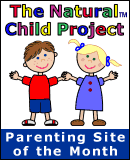| Q.
I am eight weeks pregnant and would love to know if there's some
way to minimize the chance for allergies in my new baby. My whole
family has everything from hay fever to eczema and asthma. What
can I do during the next seven months to help my baby? A.
You can start while you're pregnant. Most of the current
medical literature suggests that babies can get sensitized to
certain things while still in the womb. Dairy products are probably
at the top of the list of sensitizers (allergens) and should be
avoided if you have a strong family or personal history of allergies,
asthma or eczema. I know, I know, everyone (maybe even your obstetrician)
says that you need to drink milk and eat cheese to get your protein
and your calcium. There are other ways of getting these vital
nutrients. At the very worst, calcium needs could be met with
a supplemental pill. Protein is available from beans and soy (safer
than current news releases would have you believe) and fish and
chicken and other very conventional sources. Vegetarians have
no trouble meeting protein needs and neither do dairy-free allergy-prone
pregnant moms-to-be.
Another naturally
oriented trick to minimizing allergies for yourself or your baby
involves eating local honey. That is, honey made by bees in your
local area. This is thought to act like an allergy shot by exposing
your immune system to tiny doses of local pollen and desensitizing
you to allergies against the plants from which they come.
After your little
sweetheart is born, continue an anti-allergy routine by avoiding
dairy, eggs, peanuts, and--for those families with the biggest
problems--wheat and citrus. This diet might sound a little too
restrictive for most people, but, at the very least, don't expose
your baby to cow's milk through your breastmilk.
Environmental allergens
might be a little easier to avoid during the first months of life.
Feather pillows and quilts cause allergies. Use synthetics when
you purchase these and, of course, use no pillows or quilts at
all for babies when they are sleeping away from you for safety
reasons. If at all possible, have bare floors rather than carpets
in the room the baby sleeps in and avoid horizontal blinds because
they collect dust no matter how clean your house is.
Stuffed toys (a
favorite gift!) are stuffed with heaven knows what--are you reassured
by the tag that says "Stuffed With All New Material in Fredonia?"--and
these toys also collect dust even in the cleanest of houses.
Get a HEPA type
air filter to clean the air as much as possible and have your
air conditioning and heating system cleaned by a professional
before the baby's born. There are special filters and even ultraviolet
treatments to minimize mold. Mold can be a problem in any house
and avoiding excessive moisture may keep it under control.
|



